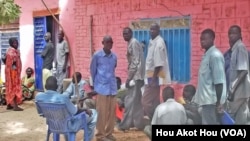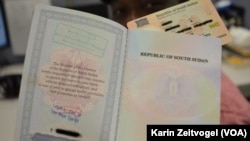AWEIL, SOUTH SUDAN —
The United Nations High Commissioner for Refugees (UNHCR) has provided free national identity cards to 1,000 South Sudanese living in camps for returnees in Northern Bahr el Ghazal.
Among them were hundreds of people living in the Apada returnee camp outside Aweil.
South Sudanese who fled during the long civil war, and have returned in their droves since the comprehensive peace agreement was signed in 2005, have been unable to find work or attend school since they came back -- because they don't have national ID cards.
The IDs are required for most jobs, to sit exams, and to apply to university. But they usually cost 45 South Sudanese pounds, or about 11 U.S. dollars, and many South Sudanese can't afford that sort of outlay.
The gross national income in South Sudan is around three US dollars a day, but in the camps, many people have no income at all.
UNHCR officials started working this month with the chiefs of the returnee camps around Aweil to collect the names of the most vulnerable before handing out free IDs to them on Tuesday.
Ngong Ngong Atak, 25, was one of the lucky recipients of the coveted card.
“This will make it easier for us to register and sit for exams. Some of us also want to get into university and without [the IDs], we cannot. The UNHCR has been helpful to us,” he said.
Agany Macham, 37, also received an ID. He has been without a job since he returned to South Sudan in 2011 and has had a hard time feeding his family. Now that he has a national ID, he plans to look for work.
The UNHCR handed out 400 national identity cards at Apada camp, and plans to give out several thousand more to returnees in Warrap and Western Bahr el Ghazal states.
More than 700,000 South Sudanese returned from Sudan to South Sudan before a 2010 referendum on independence for the south.
An estimated 230,000 South Sudanese are still in Sudan and want to return to the south, which became independent in July 2011.
Returnees aren't the only ones having problems getting a national ID: last month, the recently opened passport office in Aweil, the state capital of Northern Bahr el Ghazal, stopped issuing the cards.
The reason? Would-be cardholders needed to show a birth certificate to get the cherished ID, but the hospital that issues birth certificates said it has to get them from Juba -- and officials in the national capital were not sending them.
Among them were hundreds of people living in the Apada returnee camp outside Aweil.
South Sudanese who fled during the long civil war, and have returned in their droves since the comprehensive peace agreement was signed in 2005, have been unable to find work or attend school since they came back -- because they don't have national ID cards.
The IDs are required for most jobs, to sit exams, and to apply to university. But they usually cost 45 South Sudanese pounds, or about 11 U.S. dollars, and many South Sudanese can't afford that sort of outlay.
The gross national income in South Sudan is around three US dollars a day, but in the camps, many people have no income at all.
UNHCR officials started working this month with the chiefs of the returnee camps around Aweil to collect the names of the most vulnerable before handing out free IDs to them on Tuesday.
Ngong Ngong Atak, 25, was one of the lucky recipients of the coveted card.
“This will make it easier for us to register and sit for exams. Some of us also want to get into university and without [the IDs], we cannot. The UNHCR has been helpful to us,” he said.
Agany Macham, 37, also received an ID. He has been without a job since he returned to South Sudan in 2011 and has had a hard time feeding his family. Now that he has a national ID, he plans to look for work.
The UNHCR handed out 400 national identity cards at Apada camp, and plans to give out several thousand more to returnees in Warrap and Western Bahr el Ghazal states.
More than 700,000 South Sudanese returned from Sudan to South Sudan before a 2010 referendum on independence for the south.
An estimated 230,000 South Sudanese are still in Sudan and want to return to the south, which became independent in July 2011.
Returnees aren't the only ones having problems getting a national ID: last month, the recently opened passport office in Aweil, the state capital of Northern Bahr el Ghazal, stopped issuing the cards.
The reason? Would-be cardholders needed to show a birth certificate to get the cherished ID, but the hospital that issues birth certificates said it has to get them from Juba -- and officials in the national capital were not sending them.





